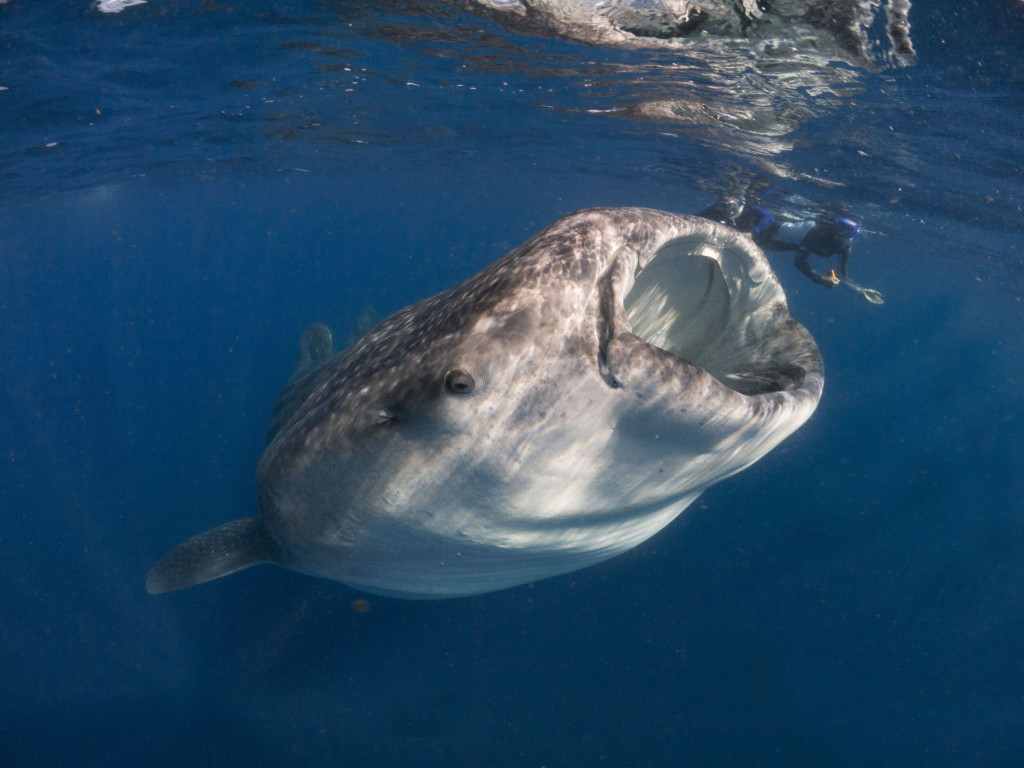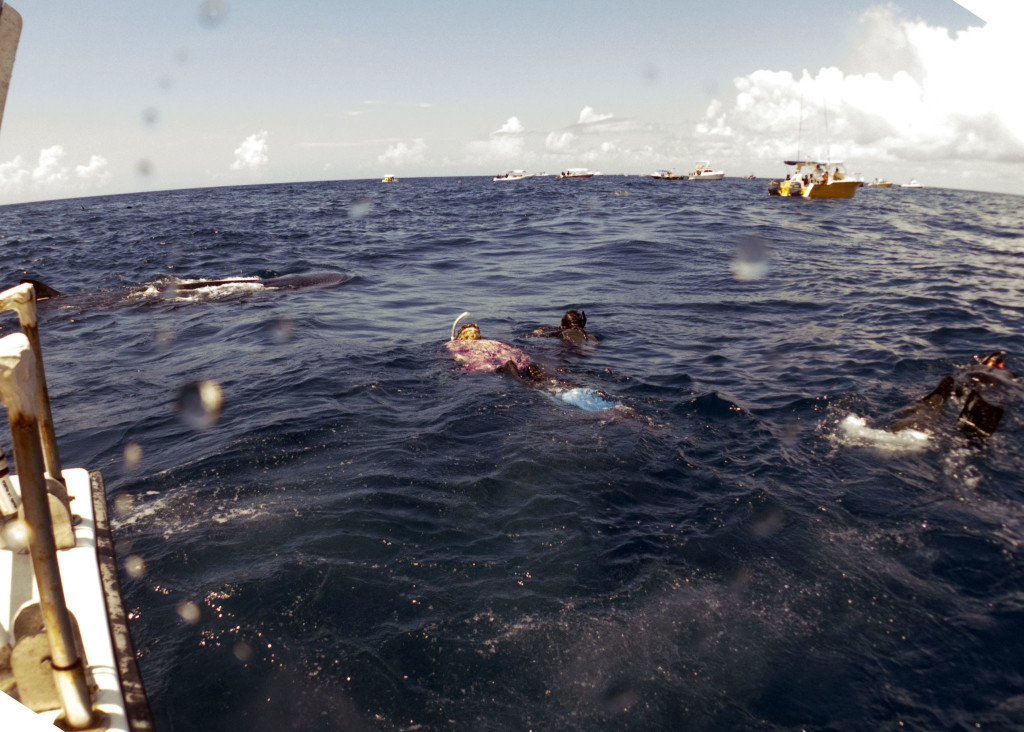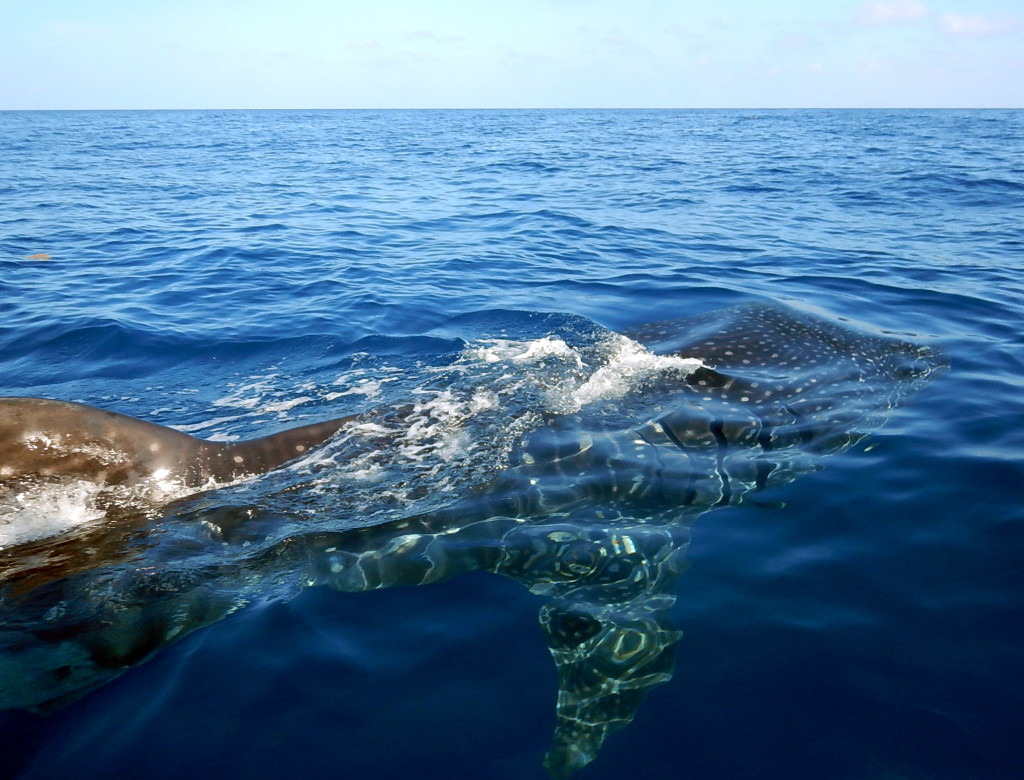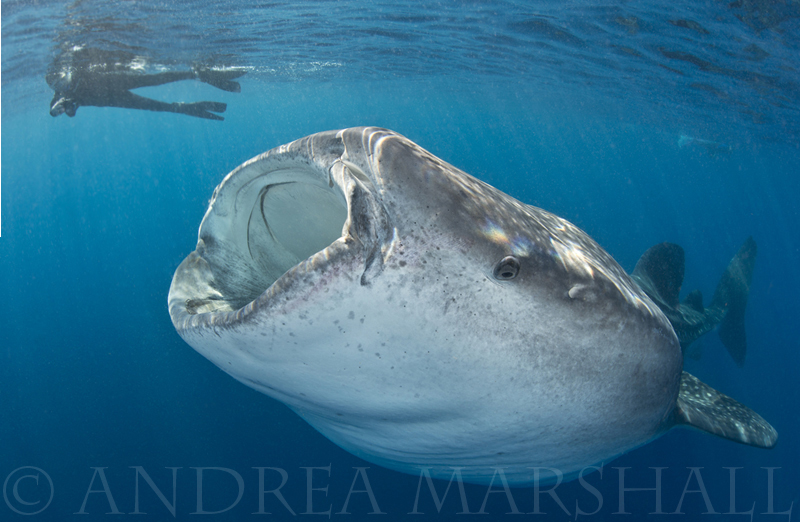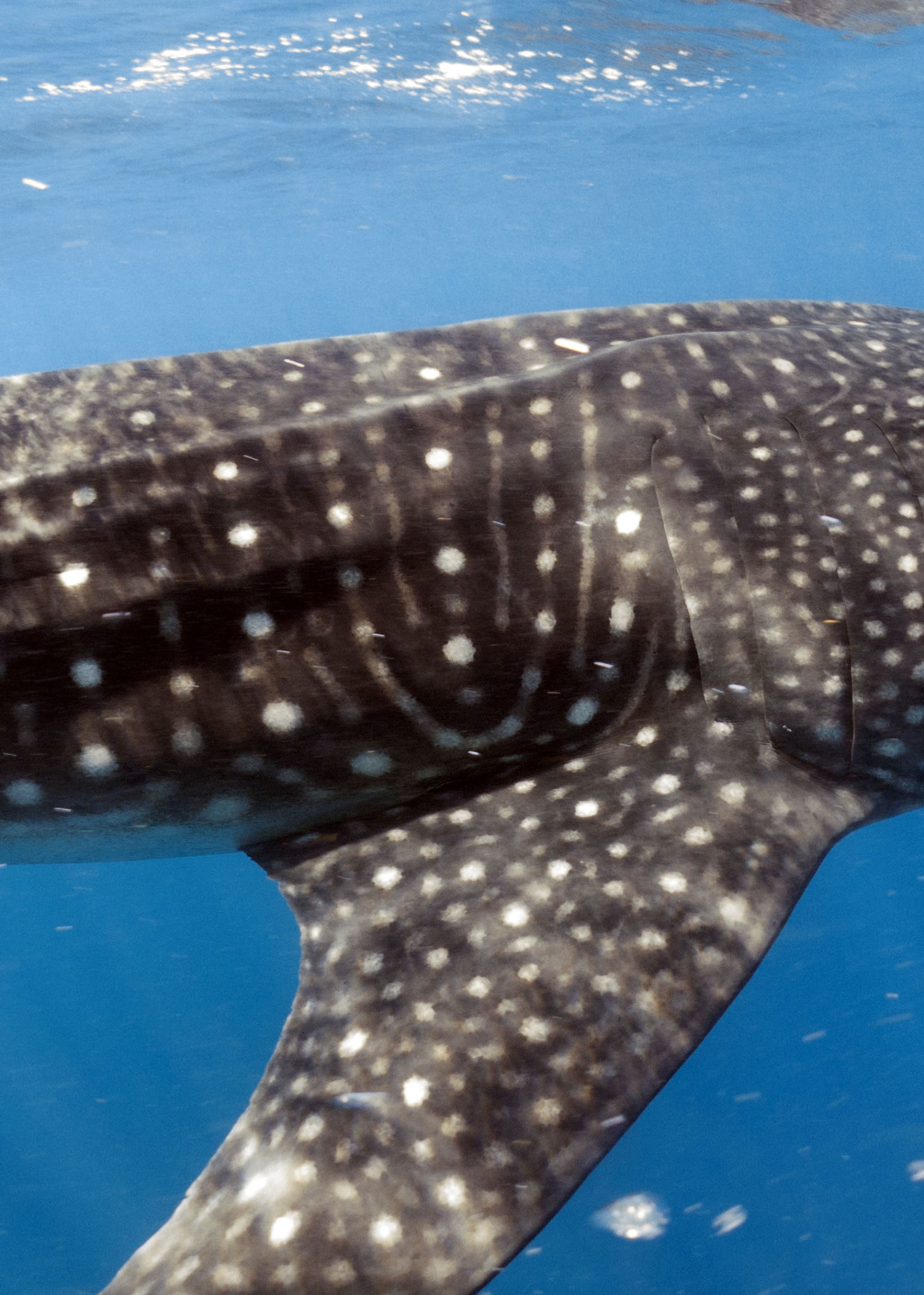Marine Life & Conservation
Citizen Science with Marine Megafauna Foundation
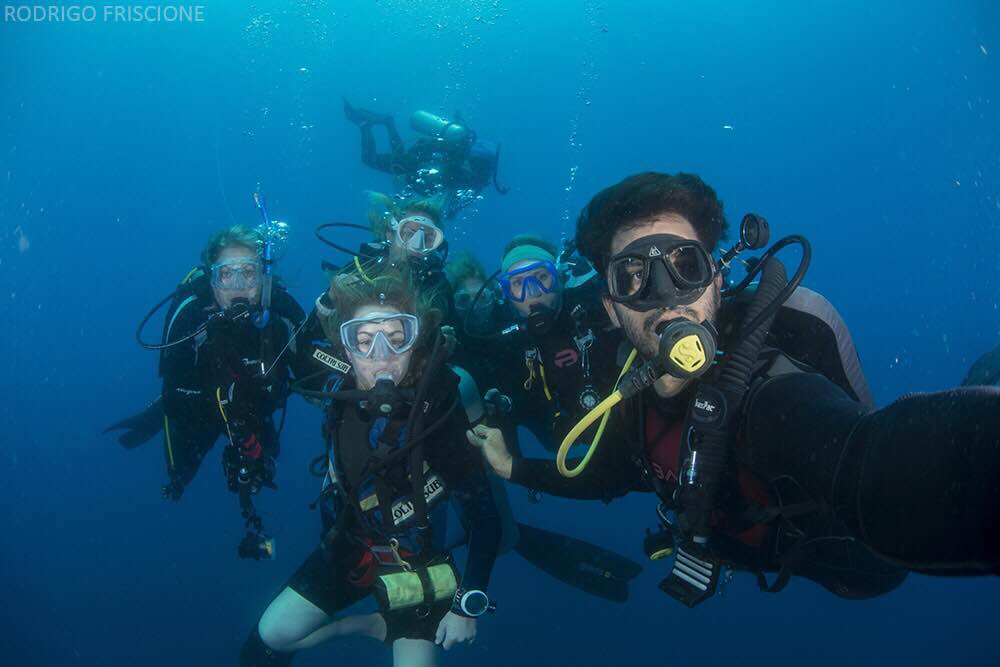
The Marine Megafauna Foundation Ray of Hope Expedition 2015 included a marine biologist (USA), a geneticist (Japan, living and working in the US), a biologist from the Maldives (a Scot by birth), a scuba instructor from the Maldives (a Kiwi), a Penn biology major (from Mexico), a videographer (South Africa), and those of us, scuba divers and/or photographers, who care deeply about our watery world, both Canadian and US. Our mission was to photograph animals (Whale Sharks and Manta Rays) for Identification, upload to Whaleshark.org and MantaMatcher.org, and to take genetic samples from the Manta Rays of the Yucatan. We were not entirely successful with the Mantas…the elusive creatures… well, they eluded us! We did manage to get 7 or so, but we fell far short of the desired 30 samples.
Whale Sharks, on the other hand, were in abundance. The Yucatan is one of the world’s largest aggregations of whale sharks, if not the largest. We headed out in the mornings for a 90 minute boat ride to the shark area, typically just before sunrise, and seeing the dawn out on the calm Caribbean Sea was a serenely beautiful experience. Once out to the shark area (wherever the whale sharks are gathering and feeding that particular day) it became disheartening to see all the tourist boats. There must have been 50 boats on some days.
Please do not get me wrong. We are trying to conserve and preserve these animals by showing how valuable they are to tourism, and valuable they certainly are. Tourists are out in droves to see and to swim with them. 40 or 50 boats at a time can seem pretty excessive, though. The first day we hung out on the edges, swimming with the sharks who were on the periphery of the tourists. We were on a scientific vessel and had a permit to be in the water with them for study. The first day was very shark rich, and I was able to get several ID shots, as did other members of the group. The best day was ahead, however.
On the third day of the expedition we headed out looking for mantas, and skipped the whale sharks until around noon. By that time, the boats were gone. We had 30 or so whale sharks to ourselves, and one other boat. It had to have been one of the best animal encounters I have ever had. Without the hoard of boats, one could be patient, waiting for feeding whale sharks to swim by. We didn’t have to chase them, or even swim that hard to stay up with them (they may look as though they are moving slow, but they are really going much faster than you think) because they were lazily filtering the surface of the water, knowing they were pretty much alone and in no hurry. With several boats, it gets confusing, and the sharks often have to change course to avoid snorkelers, but on this day, they were content and feeding happily on tuna spawn. Every time we got out of the water we had to brush off tuna eggs from our wetsuits and hair.
I have not been happy with the whale shot photographs I have taken over the years. On this glorious day, alone with whale sharks, I took the best photographs I have ever taken of these spotted, gentle giants. Just incredible!
My dream has always been to watch a whale shark vertically feeding in the water, and to capture photos of it. My dream came true with a huge, pregnant Whale Shark who had to be 40 feet long. She was immense, and it was amazing to watch her, vertical and still, while she filtered tuna spawn. Ah, she was such a beauty! And lucky for me, Dr Andrea Marshall (the Director of Marine Megafauna Foundation and Ray of Hope) was in the water and captured an incredible, once in a lifetime photo of me with the whale shark. Yes, I will be framing it! I can’t tell you how thrilling it is to have a photo of this quality! Thank you, Andrea!
I took several ID photos and uploaded them to www.whaleshark.org. It was exciting to receive a few matches, telling me that I had photographed a shark who had been photographed several times over the past 5 years. It’s also exciting NOT to receive matches, meaning I uploaded photos of sharks who were new to the system. I am thrilled to be able to assist conservation science by being a Citizen Scientist.
“In today’s world, it’s clear that our natural environment cannot be preserved and protected by the few people officially designated with this task. It will take all of us, in all parts of the world. We all need to find ways to help in this monumental task.
Citizen Science offers each of us a path to find special ways in which we can each help protect our part of the world. It’s an elegant, efficient, and engaging solution to the huge environmental problems we face in the 21st century.” www.citizenscientists.com
I cannot begin to express the wonder and the thrill of being near to these ocean pelagics. It is truly awe-inspiring… and I am so grateful I can help in their conservation. Check out http://www.citizenscientists.com/ and check out how many ways there are to help!
For more from Tam, visit www.travelswithtam.com.
Blogs
The Ocean Cleanup Breaks 10,000,000 KG Barrier

The Ocean Cleanup, the global non-profit project, has removed a verified all-time total of ten million kilograms (22 million lbs.) of trash from oceans and rivers around the world – approximately the same weight as the Eiffel Tower.
To complete its mission of ridding the oceans of plastic, The Ocean Cleanup uses a dual strategy: cleaning up the Great Pacific Garbage Patch (GPGP) to remove the plastic already afloat in the oceans, while stopping the flow of plastic from the world’s most polluting rivers.
Through cleaning operations in the GPGP and in rivers in eight countries, the cumulative total of trash removed has now surpassed ten million kilograms. This milestone demonstrates the acceleration of The Ocean Cleanup’s impact, while underlining the astonishing scale of the plastic pollution problem and the need for continued support and action.
While encouraging for the mission, this milestone is only a staging point: millions more tons of plastic still pollute our oceans and The Ocean Cleanup intends to continue learning, improving and innovating to solve this global catastrophe.
This announcement comes as governments from around the world meet to continue negotiations to develop a new legally binding instrument to end plastic pollution at INC4 in Ottawa, Canada. Representatives of The Ocean Cleanup will be in attendance and the organization will be urging decision-makers to collaborate towards a comprehensive and ambitious global treaty which addresses plastic at all stages of its life cycle and in all marine environments worldwide, including in areas beyond national jurisdiction.
It is encouraging to see that the need for remediation is reflected in the various options for potential treaty provisions. It is essential that the final treaty contains clear targets for the remediation of legacy plastic pollution, and reduction of riverine plastic emissions.
Tackling plastic pollution requires innovative and impactful solutions. The treaty should therefore incentivize the innovation ecosystem by fostering innovations that make maximal use of data, technology and scientific knowledge – such as those designed and deployed by The Ocean Cleanup.
‘After many tough years of trial and error, it’s amazing to see our work is starting to pay off – and I am proud of the team who has brought us to this point.’ said Boyan Slat, Founder and CEO of The Ocean Cleanup. ‘While we still have a long way to go, our recent successes fill us with renewed confidence that the oceans can be cleaned.’
The Ocean Cleanup was founded in 2013 and captured its first plastic in 2019, with the first confirmed catch in the GPGP coming soon after the deployment of Interceptor 001 in Jakarta, Indonesia. After surpassing one million kilograms of trash removed in early 2022, the non-profit project has since progressed to the third iteration of its GPGP cleaning solution, known as System 03, and a network of Interceptors currently covering rivers in eight countries, with more deployments set for 2024.
About The Ocean Cleanup
The Ocean Cleanup is an international non-profit organization that develops and scales technologies to rid the world’s oceans of plastic. They aim to achieve this goal through a dual strategy: stemming the inflow via rivers and cleaning up the legacy plastic that has already accumulated in the ocean. For the latter, The Ocean Cleanup develops large-scale systems to efficiently concentrate the plastic for periodic removal. This plastic is tracked and traced through DNV’s chain of custody model to certify claims of origin when recycling it into new products. To curb the tide via rivers, The Ocean Cleanup has developed Interceptor™ solutions to halt and extract riverine plastic before it reaches the ocean. Founded in 2013 by Boyan Slat, The Ocean Cleanup now employs a broadly multi-disciplined team of approximately 140. The foundation is headquartered in Rotterdam, the Netherlands.
For more information, visit: theoceancleanup.com and follow @theoceancleanup on social media.
Marine Life & Conservation
Steve Backshall to headline Shark Trust’s flagship event: For the Love of Sharks

Join a host of amazing, shark loving, speakers including Steve Backshall and the Shark Trust team for an evening celebrating shark conservation at the Royal Geographical Society in London this November.
Date: 29th November 2024
Time: 6-10pm
Location: Royal Geographical Society, London
Tickets: https://www.sharktrust.org/Event/flos24
The event will be a celebration of all things shark. Those lucky enough to get hold of tickets will hear from engaging guest speakers with a passion for sharks.
The line-up includes (*subject to change if unforeseen circumstances arise)
Steve Backshall: One of television’s busiest presenters, BAFTA award-winning wildlife expert Steve has been passionate about the wild world ever since he was young.
Steve’s impressive TV career has taken him all around the world, investigating a wide array of species and environments. Steve has filmed over 100 hours of children’s wildlife programmes with the BAFTA award winning Deadly 60 franchise and recently, with Sky Nature, for his new series ‘Whale with Steve Backshall’. He has been a patron for the Shark Trust for 10 years.
Simon Rogerson: is a photojournalist specialising in natural history, diving and the sea.
He is editor of SCUBA magazine, the official journal of the British Sub-Aqua Club. Simon started his career as a crime reporter but gravitated towards his ‘less depressing’ interest in underwater exploration, joining the staff of DIVE magazine in 1999. In 2005 he was named ‘Editor of the Year’ in the PPA’s Independent Publishing Awards. Simon also works as a freelance writer, contributing frequently to the Sunday Times and Telegraph, in addition to BBC Wildlife, Esquire, and a host of international diving magazines. He is the author of a book, Dive Red Sea, published by Ultimate Sports. Now based in Berkshire, Simon has been a Patron of the Shark Trust for 20 years.
More speakers to be announced soon. Head to the Shark Trust website to learn more.
The evening will also allow guests the final chance to see the Oceanic 31, shark art exhibition. Some of the artwork will be auctioned/raffled at the event, while the rest will be auctioned online to raise money for the Shark Trust Oceanic Programme.
For the Love of Sharks is an evening with something for everyone who is interested and fascinated by sharks. Join the Shark Trust, their Patrons, Trustees and Staff, along with a host of supporters for this celebration of shark conservation.
For more information or to buy a ticket: https://www.sharktrust.org/Event/flos24
-

 News3 months ago
News3 months agoCapturing Critters in Lembeh Underwater Photography Workshop 2024: Event Roundup
-

 Marine Life & Conservation Blogs3 months ago
Marine Life & Conservation Blogs3 months agoCreature Feature: Swell Sharks
-

 Blogs2 months ago
Blogs2 months agoMurex Resorts: Passport to Paradise!
-

 Gear Reviews3 weeks ago
Gear Reviews3 weeks agoGEAR REVIEW – Revolutionising Diving Comfort: The Sharkskin T2 Chillproof Suit
-

 Blogs3 months ago
Blogs3 months agoDiver Discovering Whale Skeletons Beneath Ice Judged World’s Best Underwater Photograph
-

 Gear Reviews3 months ago
Gear Reviews3 months agoGear Review: Oceanic+ Dive Housing for iPhone
-

 News2 months ago
News2 months agoPADI Teams Up with Wellness Brand Neuro to Drive Ocean Change and Create a Blue State of Mind
-

 Marine Life & Conservation2 months ago
Marine Life & Conservation2 months agoSave the Manatee Club launches brand new webcams at Silver Springs State Park, Florida


